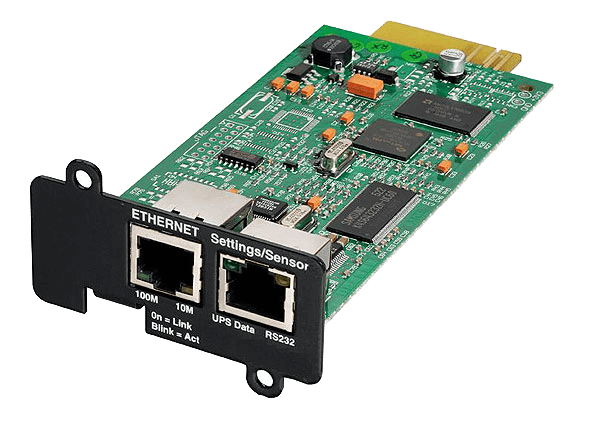
UPS Connectivity
Web SNMP, Relay, Modbus Cards, Environmental Monitoring Probes… Whatever your UPS Connectivity needs are, Power On Australia will have a solution.
Documentation / Downloads
UPS Connectivity is crucial for ensuring reliable power protection and management in most applications.
Web/SNMP Cards are commonly integrated into UPS systems to enable remote monitoring and control via web browsers or SNMP (Simple Network Management Protocol) platforms. These cards provide real-time insights into power status, battery health, and load levels, allowing administrators to remotely manage UPS devices, perform diagnostics, and receive alerts in case of power anomalies.
Relay Cards are another essential component of UPS connectivity, offering additional control functionality by allowing UPS systems to communicate with other devices such as servers or alarm systems. These cards enable automated responses to power events, such as initiating shutdown procedures for connected equipment during extended power outages or triggering alarms for critical events.
Moreover, Modbus Cards facilitate integration with building management systems (BMS) and industrial automation networks, enabling UPS systems to communicate status information and receive commands using the Modbus protocol. This interoperability enhances the overall efficiency and effectiveness of power management within complex environments.
Additionally, Environmental Monitoring Probes can be integrated into UPS systems to monitor temperature, humidity, and other environmental factors, ensuring optimal operating conditions and early detection of potential issues that could impact UPS performance.
By leveraging these connectivity options, organisations can maximise the reliability and resilience of their power infrastructure while minimising the risk of downtime and data loss.
Whatever your UPS Connectivity needs are, Power On Australia will have a solution.
Whatever your UPS Connectivity needs are, Power On Australia will have a solution.
FAQs
Are your UPS' reliable?
UPS’ are very reliable when used in accordance with the manufacturers instructions. Like many electronic devices, they can be easily mistreated.
How do UPS' work?
UPS’ work by preventing interruption of Power to the critical load. This is usually happens by providing a secondary source of energy – like a battery – to run your critical load. There are a handful of different methods for UPS operation, that deliver somewhat different results.
How do UPS' work in a data centre?
Data Centres use a large Centralised UPS array, backed up by generators as well as the grid, to keep power available to the data centre uses for many hours in circumstances when grid power has failed.
What UPS do I need?
The UPS you will need will absolutely be defined by what your load is. A PC will need a different size UPS to a refrigerator, or a variable speed drive. That’s because the loads are very different in nature.
Where is UPS used?
A UPS is expected to be used in any clean, dust Free, temperature and humidity controlled location. Using a UPS outdoors, or in a vehicle or on a ship or an oil rig requires specialist UPS systems.
Which UPS is best for home?
If you are using your UPS in a major city home, and for typical home IT equipment, like PC’s, TV’s and modems, a ‘line interactive’ UPS is all that is generally required. In areas where your power supply is weak or poor quality, or your supported equipment is more critical in nature – like a CPAP machine or humidicrib, it is best to get specialist advice.
Which UPS battery is best?
UPS batteries are divided generally into 2 types. High rate batteries and non high rate batteries. High rate batteries can support a large burst of energy for short periods of time – like 30 minutes, but have a comparatively short service life. Non high rate batteries are designed for long slow discharges, and can often support equipment for many hours, and will last near double the lifespan of high rate batteries. Battery type and sizing is complex, best to seek professional advice here.
Which UPS is best for Computer or Gaming PC?
The best type of UPS is best for every type of application because of the way it’s expected to work. These are double conversion UPS’s, sometimes called true on line UPS’s. They work very differently to more economical UPS’s, are more complex, more reliable, more powerful and significantly more expensive that the low cost UPS’s. If ‘best’ means highest reliability and best quality power output with fewest power breaks to you, get Double Conversion.
Why is UPS used?
A UPS is used solely to prevent or limit interruption of mains power to critical loads. Other add on functions like surge protection, alarms and communications and remote control of servers is not a core UPS function.
If you have a question we haven’t featured in our FAQs, please use the form above and we’ll get back to you as soon as possible. Thank you.
